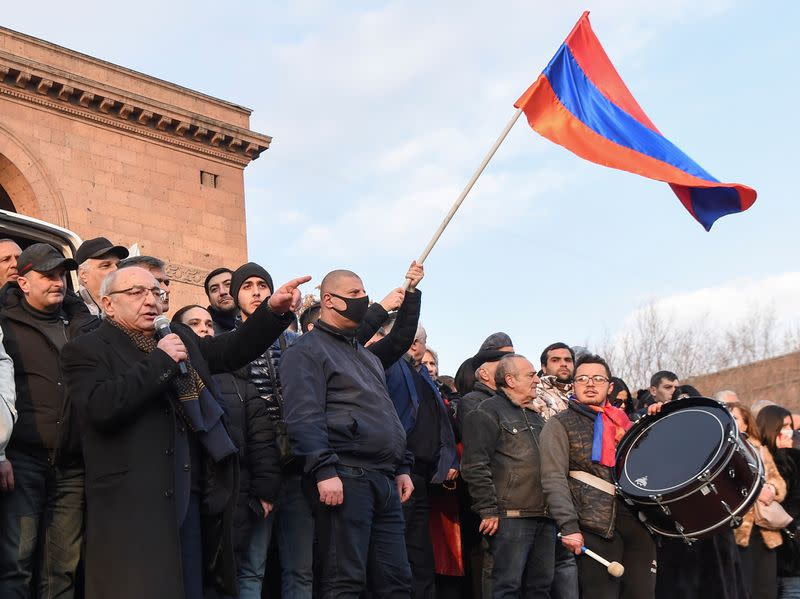YEREVAN (Reuters) – Armenian Prime Minister Nikol Pashinyan’s grip on power appears to be slipping on Friday, a day after the military called on him to quit.
Hundreds of protesters gathered in the capital Yerevan to demand his downfall, and a leading opposition figure called on the army to rebel against him. Two former presidents have already said he should retire.
Pashinyan, 45, accused the army of a coup attempt on Thursday and tried to fire the chief of staff after the army issued a written statement asking him to resign.
He has stood by since November to stop citizens accusing him of a disastrous six-week war that resulted in ethnic Armenian forces losing territories in neighboring Azerbaijan that they held for decades.
While crowds on Friday demanded his resignation, thousands of others gathered in the capital to get behind him on Thursday.
Pashinyan told his supporters on Thursday that he was firing Onik Gasparyan, the army’s chief of staff. But by Friday, the dismissal had not yet been approved by the president of Armenia, a step necessary to implement it.
President Armen Sarkissian held a meeting with Gasparyan, the president’s office said, without disclosing further details.
Vazgen Manukyan, a politician nominated by the opposition as a possible interim prime minister to replace Pashinyan, told a rally of hundreds of supporters during a rally that the army would never allow Gasparyan to be fired.
“You think the military will easily agree that Pashinyan will illegally remove their head? No. The military will revolt. I call on the military to rebel. The military should not carry out illegal orders,” Manukyan said.
The Attorney General’s Office told Reuters on Friday that it was investigating whether the army’s call for the prime minister to leave was a crime.
“The statement of the general staff and the possible risk of development around it is the subject of our attention,” Gor Abrahamyan, an assistant to the prosecutor general, told Reuters by telephone. “If any elements of a crime set out in criminal law are disclosed, a legal response will follow immediately.”
Pashinyan, a former journalist and legislator, came to power in May 2018 in a peaceful popular uprising known as Armenia’s velvet revolution.
But the loss of territory in and around the Nagorno-Karabakh enclave last year was a bitter blow to Armenians, who gained control of the territory in the 1990s in a war in which at least 30,000 people were killed.
The conflict was brought to a halt by a ceasefire agreement mediated by Russia. Moscow, which has used peacekeepers to enforce the ceasefire, said on Friday that it was crucial that the agreements be fully implemented despite Armenia’s crisis.
(Reporting by Artem Mikryukov and Nvard Hovhannisyan; Written by Tom Balmforth; Edited by Peter Graff)
